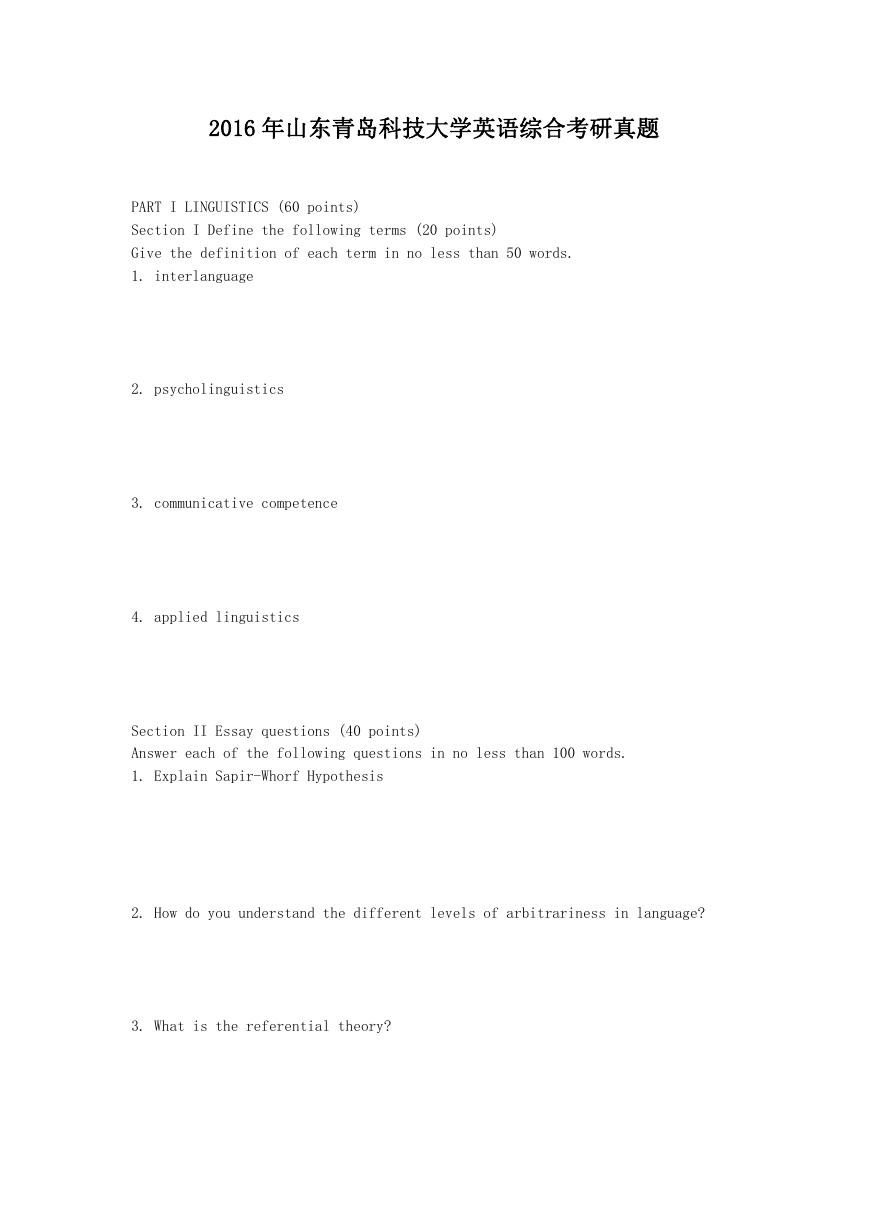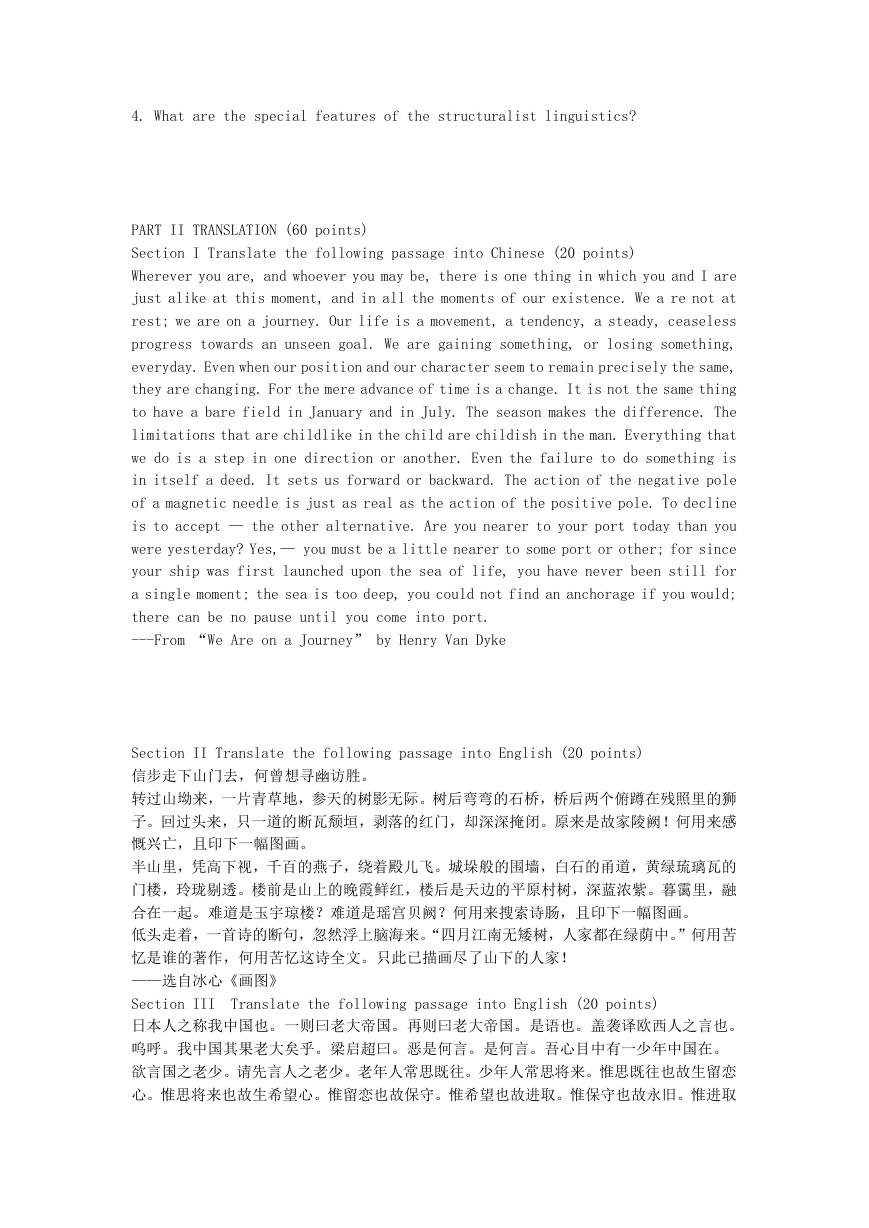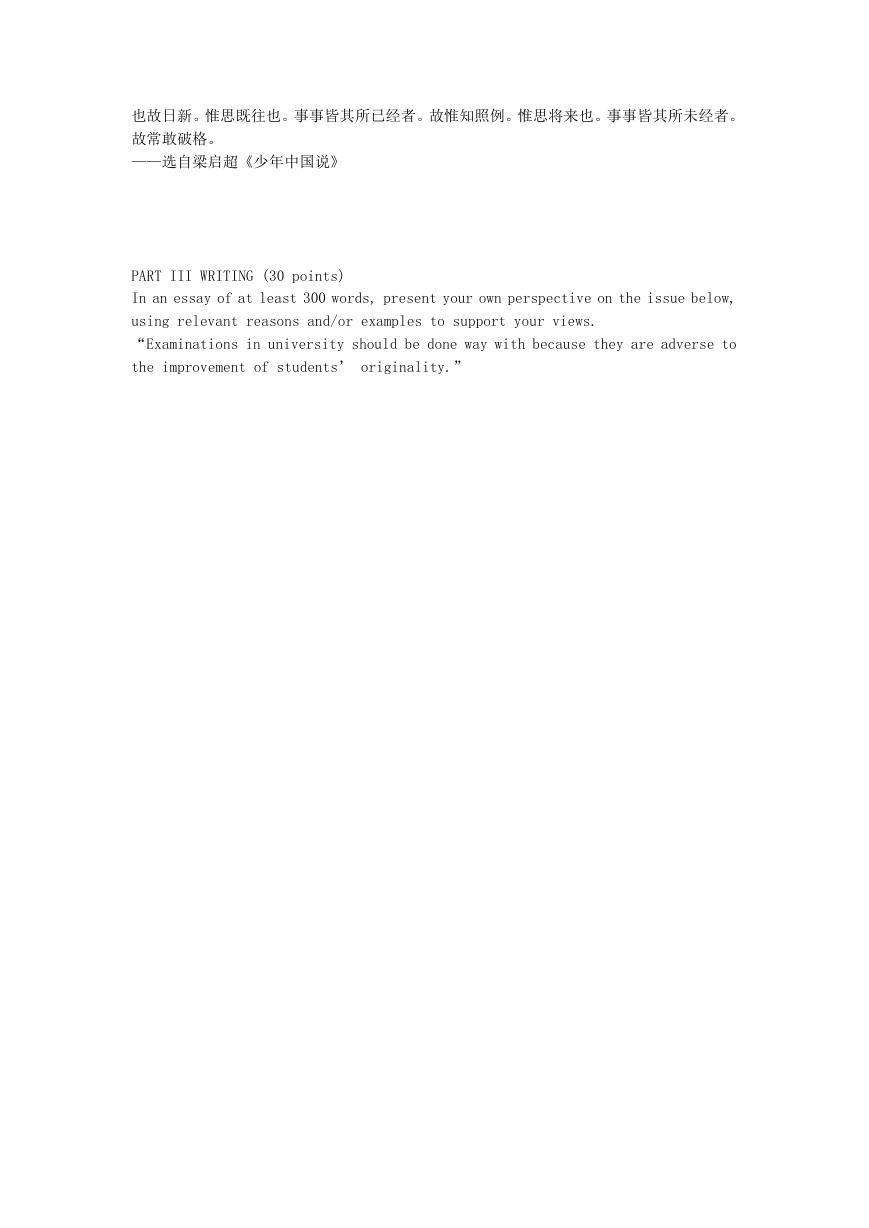2016 年山东青岛科技大学英语综合考研真题
PART I LINGUISTICS (60 points)
Section I Define the following terms (20 points)
Give the definition of each term in no less than 50 words.
1. interlanguage
2. psycholinguistics
3. communicative competence
4. applied linguistics
Section II Essay questions (40 points)
Answer each of the following questions in no less than 100 words.
1. Explain Sapir-Whorf Hypothesis
2. How do you understand the different levels of arbitrariness in language?
3. What is the referential theory?
�
4. What are the special features of the structuralist linguistics?
PART II TRANSLATION (60 points)
Section I Translate the following passage into Chinese (20 points)
Wherever you are, and whoever you may be, there is one thing in which you and I are
just alike at this moment, and in all the moments of our existence. We a re not at
rest; we are on a journey. Our life is a movement, a tendency, a steady, ceaseless
progress towards an unseen goal. We are gaining something, or losing something,
everyday. Even when our position and our character seem to remain precisely the same,
they are changing. For the mere advance of time is a change. It is not the same thing
to have a bare field in January and in July. The season makes the difference. The
limitations that are childlike in the child are childish in the man. Everything that
we do is a step in one direction or another. Even the failure to do something is
in itself a deed. It sets us forward or backward. The action of the negative pole
of a magnetic needle is just as real as the action of the positive pole. To decline
is to accept — the other alternative. Are you nearer to your port today than you
were yesterday? Yes,— you must be a little nearer to some port or other; for since
your ship was first launched upon the sea of life, you have never been still for
a single moment; the sea is too deep, you could not find an anchorage if you would;
there can be no pause until you come into port.
---From “We Are on a Journey” by Henry Van Dyke
Section II Translate the following passage into English (20 points)
信步走下山门去,何曾想寻幽访胜。
转过山坳来,一片青草地,参天的树影无际。树后弯弯的石桥,桥后两个俯蹲在残照里的狮
子。回过头来,只一道的断瓦颓垣,剥落的红门,却深深掩闭。原来是故家陵阙!何用来感
慨兴亡,且印下一幅图画。
半山里,凭高下视,千百的燕子,绕着殿儿飞。城垛般的围墙,白石的甬道,黄绿琉璃瓦的
门楼,玲珑剔透。楼前是山上的晚霞鲜红,楼后是天边的平原村树,深蓝浓紫。暮霭里,融
合在一起。难道是玉宇琼楼?难道是瑶宫贝阙?何用来搜索诗肠,且印下一幅图画。
低头走着,一首诗的断句,忽然浮上脑海来。“四月江南无矮树,人家都在绿荫中。”何用苦
忆是谁的著作,何用苦忆这诗全文。只此已描画尽了山下的人家!
——选自冰心《画图》
Section III
日本人之称我中国也。一则曰老大帝国。再则曰老大帝国。是语也。盖袭译欧西人之言也。
呜呼。我中国其果老大矣乎。梁启超曰。恶是何言。是何言。吾心目中有一少年中国在。
欲言国之老少。请先言人之老少。老年人常思既往。少年人常思将来。惟思既往也故生留恋
心。惟思将来也故生希望心。惟留恋也故保守。惟希望也故进取。惟保守也故永旧。惟进取
Translate the following passage into English (20 points)
�
也故日新。惟思既往也。事事皆其所已经者。故惟知照例。惟思将来也。事事皆其所未经者。
故常敢破格。
——选自梁启超《少年中国说》
PART III WRITING (30 points)
In an essay of at least 300 words, present your own perspective on the issue below,
using relevant reasons and/or examples to support your views.
“Examinations in university should be done way with because they are adverse to
the improvement of students’ originality.”
�






 2023年江西萍乡中考道德与法治真题及答案.doc
2023年江西萍乡中考道德与法治真题及答案.doc 2012年重庆南川中考生物真题及答案.doc
2012年重庆南川中考生物真题及答案.doc 2013年江西师范大学地理学综合及文艺理论基础考研真题.doc
2013年江西师范大学地理学综合及文艺理论基础考研真题.doc 2020年四川甘孜小升初语文真题及答案I卷.doc
2020年四川甘孜小升初语文真题及答案I卷.doc 2020年注册岩土工程师专业基础考试真题及答案.doc
2020年注册岩土工程师专业基础考试真题及答案.doc 2023-2024学年福建省厦门市九年级上学期数学月考试题及答案.doc
2023-2024学年福建省厦门市九年级上学期数学月考试题及答案.doc 2021-2022学年辽宁省沈阳市大东区九年级上学期语文期末试题及答案.doc
2021-2022学年辽宁省沈阳市大东区九年级上学期语文期末试题及答案.doc 2022-2023学年北京东城区初三第一学期物理期末试卷及答案.doc
2022-2023学年北京东城区初三第一学期物理期末试卷及答案.doc 2018上半年江西教师资格初中地理学科知识与教学能力真题及答案.doc
2018上半年江西教师资格初中地理学科知识与教学能力真题及答案.doc 2012年河北国家公务员申论考试真题及答案-省级.doc
2012年河北国家公务员申论考试真题及答案-省级.doc 2020-2021学年江苏省扬州市江都区邵樊片九年级上学期数学第一次质量检测试题及答案.doc
2020-2021学年江苏省扬州市江都区邵樊片九年级上学期数学第一次质量检测试题及答案.doc 2022下半年黑龙江教师资格证中学综合素质真题及答案.doc
2022下半年黑龙江教师资格证中学综合素质真题及答案.doc